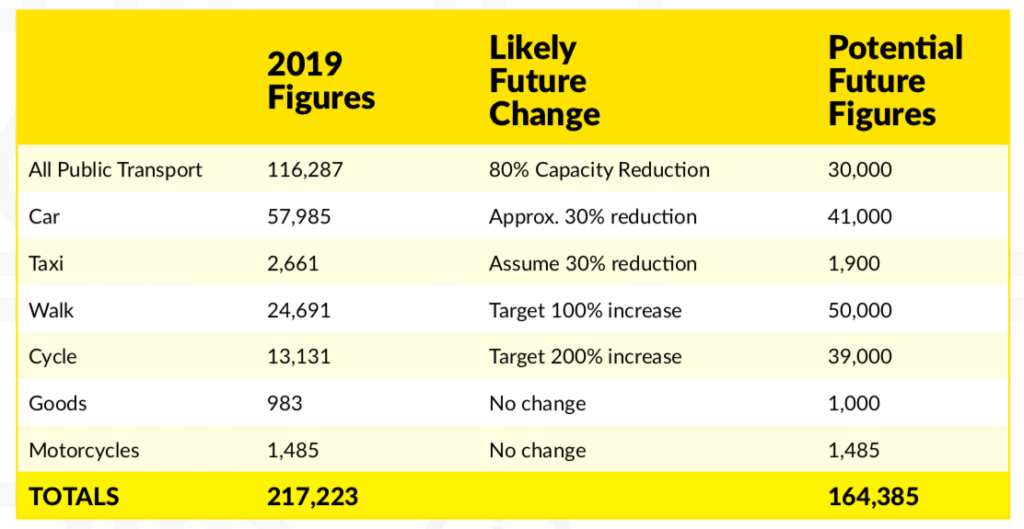Dublin is pedestrianizing five streets in the city’s main shopping area for four weekends, starting from the last weekend in July.
The trial run has given businesses the space to allow for safe physical distancing measures by setting up tables and chairs outside, and may attract much-needed customers as the city eases COVID-19 restrictions.
“It is something businesses want – we’re very hopeful it will help support improved footfall,” Green Party Councillor for the North Inner City, Janet Horner, told the media.
Councillor Horner said authorities are trying to make it “safer, more convenient and more pleasant” for people to leave their cars at home — a challenge faced by many cities as public transport capacity around the world is reduced to facilitate safe physical distancing.
In Dublin, that translates to a 20 per cent decrease in public transport capacity on normal levels as operators accommodate the two-metre spacing requirement between passengers.
And that would mean more Dubliners turning to cycling, walking and cars to get around.
The car-free shopping streets trial is one of many the Dublin City Council is looking at as it puts in place a COVID-19 mobility strategy, which it released in May in anticipation of emergence from a lockdown to prevent the spread of the virus.
“Enabling the City to Return to Work: Interim Mobility Intervention Programme for Dublin City” proposes measures such as more space for pedestrians and cyclists and in locations where people wait for public transport, as well as possible additional parking in the periphery of the city core area.
Its goal is “to allow the city to function under the new arrangements arising from the country’s COVID-19 response, both in terms of providing space for safe movement and business activities, and in accommodating the changed transport patterns”.
The framework of mobility proposals, crafted and released together with Ireland’s National Transport Authority, is expected to be a responsive one.
“The gradual reopening of the economy and society as set out by the Government strategy will present new challenges as it unfolds”, so the City expects it will be “a live programme”.
The proposed measures “are being implemented on a temporary basis to respond to the urgent and immediate needs of the city”, and “will be reviewed periodically to assess their effectiveness and, because of their nature and type of implementation, can be modified as needed to respond to changing needs and requirements”.
The interventions being explored include increasing the number and extent of pedestrian areas in the city core, as with the current weekend trials, providing protected cycle lanes and parking, and providing continuous bus lanes and bus priority measures.
When COVID-19 measures were at their strictest in Dublin, the strategy states, car traffic fell by 70 per cent, city bus usage by 90 per cent, and rail usage by about 97 per cent.
“Reduced traffic levels have resulted in many positive impacts including cleaner air, less noise pollution and an increase in people walking and cycling in their local neighbourhoods,” the City Council states.
The strategy focuses solely on getting the city moving in a safe, viable way, but the new measures under the “live programme” could bring longer term gains.
“It is something the people want. It is good for the environment; it is good for the air quality and it has been in the Dublin Development Plan since 2016 as well,” said Councillor Horner.
According to the media, Ireland’s Transport Minister Shane Ross told parliament that he expected that several other cities in the country would develop similar COVID 19 mobility frameworks in the coming months.
“I intend that similar plans will be developed for Cork, Limerick, Galway and Waterford. This emphasis on active travel isn’t just a short term measure, it has been a feature of the submissions we received during our consultation on our sustainable mobility policy in the last few months,” he said.
Read the strategy (pdf): Enabling the City to Return to Work: Interim Mobility Intervention Programme for Dublin City
Banner photo by the Dublin City Council
